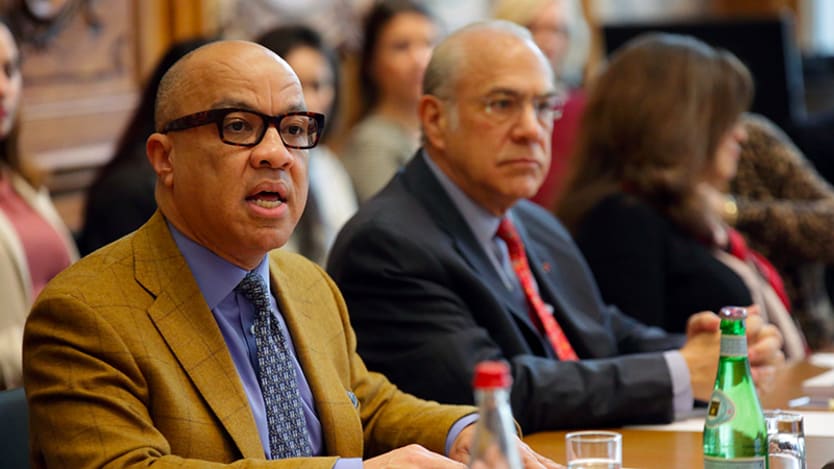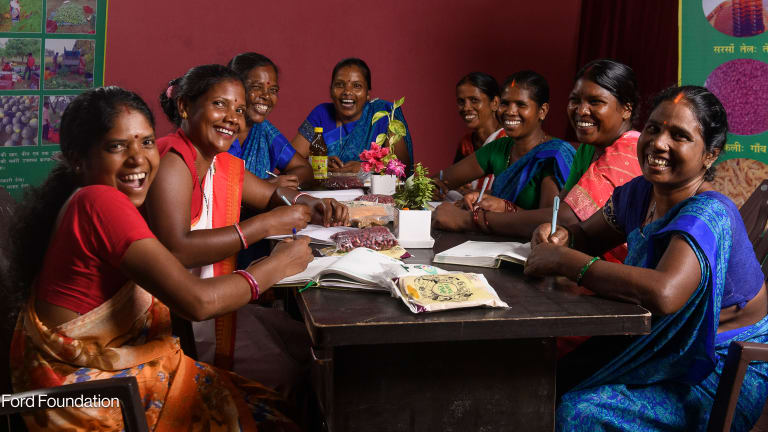
SAN FRANCISCO — Darren Walker, president of the Ford Foundation, has two sticky notes on his computer monitor. The pair of personal mottos read: “Pressure is a privilege” and “You rest, you rust.”
The work of justice demands the convergence of these two ideas, Walker said: Taking stock of privilege and asking how to put skills into service.
He suggests a phrase for others to consider posting in a place where they can be reminded of it often: “Justice is calling.”
“Unfortunately in the development world, we often privilege credentialed knowledge, and people in development know the risk associated with that.”
— Darren Walker, president, Ford FoundationThis week Walker released his book “From Generosity to Justice: A New Gospel of Wealth.” Justice, he says, is about “investing your money, time, resources, knowledge, and networks to change the root causes that create the need for charity in the first place.”
Devex spoke with Walker, who has overseen the foundation’s shift to direct all of its grantmaking to inequality, about the role the global development community can play in this shift from generosity to justice.
This conversation has been edited for length and clarity.
You explain in the book that you have heard from a lot of people who want to do the work to move from charity to justice. A lot of the examples you provide are from the world of philanthropy, but have you heard from other donors, and do you feel they are making this shift?
I definitely hear from people in the development community.
And one of the challenges quite candidly is that people acknowledge and share my diagnosis, but they are constrained in institutions and institutional structures that limit their ability to actually fully embrace the message of my book.
So there are people who work at bilateral agencies, multilateral agencies, who say, “Yes we need to treat our partners more like partners rather than contractors, but our own institutional governance requires that we treat them like contractors.”
We have worked with the Norwegian development agency, and they were incredibly flexible in how they worked to structure the Tenure Facility in a way that really responded to the needs of grassroots organizations. And even within organizations that at a high level they have this challenge, you will find within them the people who are savvy operators who figure out ways to respond to the urgency of justice.
And so what I wouldn’t want to do is to over generalize about development being unable to respond, because I do believe there are reasons for hope here as we look at the development community and the development ecosystem globally.
You write about how the Bill & Melinda Gates Foundation learned about the importance of listening to the people who experience the problems. Those learnings helped to inform a much bigger emphasis on human-centered design at the foundation. What is your message for others about the importance of listening?
My book has a message of listening to those closest to the challenges that we’re trying to solve and to not privilege credentialed knowledge over lived experience and authentic knowledge.
Unfortunately in the development world, we often privilege credentialed knowledge, and people in development know the risk associated with that.
Now that’s not to say that credentials don’t matter, because credentials do matter, it’s just that people living closest to the problem their experience should also matter.
Understanding that our interventions land in a place that is defined by its own history, its unique cultural norms and practices, and behaviors of the very communities we're seeking to help. That’s often not understood. It’s often downplayed or even ignored. And the roads of rural villages across Africa are littered with the equipment of failed development projects that did not consider culture and local context.
I was particularly interested in your interview with philanthropist Laurene Powell Jobs. There are a growing number of ultra high net worth individuals from Silicon Valley and the West Coast. What do you hope they take away from this book?
What Laurene was talking about is the issue of privilege and how does one leverage that privilege.
Part of the new gospel is the move beyond the idea that to whom much has been given a responsibility rests to give. That idea is important, but it’s not enough. It’s important to acknowledge that privilege and say: What am I doing with that privilege?
One of the things that frustrates me about some West Coast philanthropists is their belief that technology will provide the solution without fully understanding the context and the nuance and the social implications of their intervention.
“Change needs to quicken. And it’s only going to change when the leaders of development agencies and foundations and philanthropists embrace the idea that our central work is to build a more just world, a world with more justice and fairness.”
—And on the other hand, I am encouraged, and inspired by, the sense of optimism and belief in the future that you see among the West Coast philanthropists. What I hope to see more of is an acknowledgement that the kind of reform we want to see in the world is only going to come from attacking the root causes of these challenges.
Incremental two or three year initiatives are helpful, but they have to be considered in the longer arc of investments needed to sustain change. I believe that we do need moonshot philanthropy, but we also need sustained investment over long periods of time that address the systemic barriers to reducing inequality and poverty.
And so I think we need breakthroughs, I think we need innovation, but at the end of the day many of these problems that are rooted in forms of prejudice have to be acknowledged if we’re serious about solving these problems.
Your book serves as a call to action. You write: “It is beyond the capacity of philanthropy to fix our economic and political systems entirely. But I believe that as beneficiaries of the biases and flaws of these systems, holders of wealth and influence today—whether individuals, corporations, or foundations— share an urgent obligation to try.” I want to narrow in on that point about urgency and whether you think that sense of urgency is felt.
Change needs to quicken. And it’s only going to change when the leaders of development agencies and foundations and philanthropists embrace the idea that our central work is to build a more just world, a world with more justice and fairness.
In this time of the existential threat of climate change and growing inequality in the world, there has to be a sense of urgency in our work.
My fear is that the leaders of too many of these institutions aren’t prepared or willing to change — to change our own behavior, to change our traditional standards and our normative practices and behaviors — that can sometimes contribute that can sometimes compound the problem rather than move us towards solutions.








